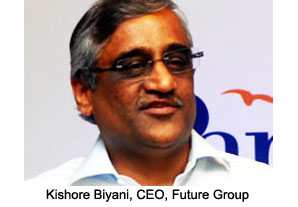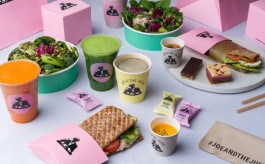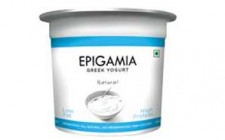Future Group's'rebirth' to focus on four areas
By Chaitanya Muppala | June 19, 2015
Biyani gets biggies to showcase group's strategy today
 Future Group founder and chief executive Kishore Biyani wants to recast the strategy of the group and likes to call it "rebirth".
Future Group founder and chief executive Kishore Biyani wants to recast the strategy of the group and likes to call it "rebirth".To showcase the rebirth, he has roped in Ram Charan, who is his mentor; Sadguru Jaggi Vasudev, whose corporate lessons Biyani follows; and Sunil Mittal, whose corporate credentials he admires; to speak at the 'FutuReborn' event this Friday. So you get to hear from an academician, spiritual leader and corporate honcho, promises Biyani.
What is the rebirth he is talking about? Biyani had said "without destroying something you cannot create something new" when he sold the group's jewel, Pantaloons, to Aditya Birla Group in 2012 to reduce debt. Now, he is looking at creating new strategies.
|
FUTUREBORN |
|
·The group's rebirth will have four steps, according to Future Group founder and chief executive Kishore Biyani ·The first leg is to become a Rs 20,000-crore giant by 2021 ·The second aspect of his strategy is opening small stores ·The third aspect is using shopping data for better value ·And, finally, Biyani aims to be a multi-channel retailer |
"India is changing. Consumers are changing
and consumption is changing. So, as a group, we have to change for tomorrow's
India. It is as good as rebirth," he said. And the rebirth will mature in
2021.
The group's rebirth will have four steps,
according to the chief executive. The first leg is to become a Rs 20,000-crore
FMCG (fast moving consumer goods) giant by 2021. Biyani is looking to launch
oats, 100 varieties of flour, sauces and dips from its food park in Tumkur,
Karnataka. He is also looking at launching personal care products.
However,
Biyani is not content. He is also looking to sign joint ventures and acquire
FMCG brands to perk up his consumer goods play. So, on the anvil are joint
ventures in ice-creams, chocolates and biscuits.
In late 2013, he tied up with US-based food and
beverages player Sunkist to manufacture market and sell the Sunkist range of
fruit juices, juice drinks and sparkling (carbonated) beverages in India.
In May, Biyani acquired the consumer products
business of Aditya Birla Group, Grasim Industries. Grasim's consumer products
division makes face-care wipes, baby wipes and other products in baby and
house-care segments under brands such as Kara, Puretta, Handys and Prim.
The second aspect of his strategy is small
stores. After Big Bazaar, the supermarket chain that revolutionised modern
retail, Biyani aims to set up 4,000 neighbourhood stores across KB's Fair
Price, Nilgiris, Easy Day and other formats. "With the focus on small
stores, we acquired Nilgiris and Easy Day," he said.
The third aspect is data analytics. "Nearly
2.8 crore people shop at our stores and we want to use that shopping data to
provide better value for our customers in the future," he said. In October
last year, the group entered into a joint venture with Tesco's data analytics
arm Dunhumby, wherein the latter would leverage on consumer data generated from
Future Group's network and work with the retailer and its suppliers more effectively.
And, finally, Biyani aims to be a multi-channel
retailer. Biyani is expected to launch his multi-channel strategy later this
year. "We have created a plan - 50,000 online agents and with our stores,
assisted shopping, pay anywhere, pick up anywhere - the whole strategy will
emerge slowly but steadily. Today, 60 per cent of the business in e-commerce
comes from four cities. We want to tap 16,000-18,000 pin codes. This is a
journey," he told Business Standard recently.
"Conceptually, I cannot fault what Kishore
is talking about. All the things he is talking about are relevant in today's
and tomorrow's world. Whether it is accessing customers wherever they are
staying, e-commerce, private labels and talking them to general trade, need for
understanding customers deeply are most relevant whichever formats you are
running," said Bijou Kurien, board member, L Capital Asia and former chief
executive, lifestyle at Reliance Retail.








